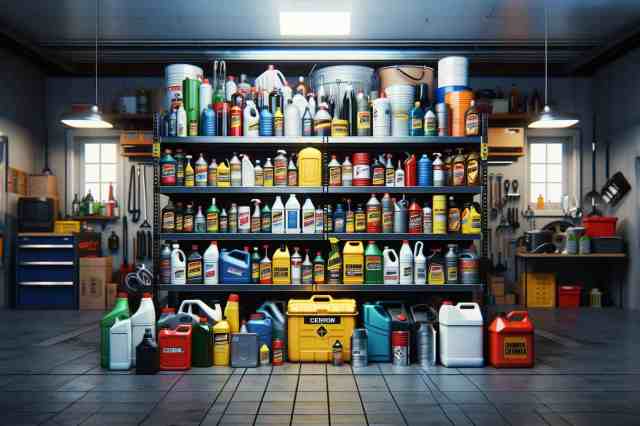Homes and offices alike typically hold a number of chemical products. This could range from cleaning and maintenance supplies, to bathroom products, medicines, renovation materials, and more. Most people tend to just stick the various bottles in a closet or cabinet and forget about them. However, if chemical products are not stored safely, they could leak, cause corrosion, and even explode. It is even more dangerous if there are small children or pets around. Since most chemical products are fatally toxic, they could cause severe illness and death if consumed. This guide will help you learn how to store chemical products correctly so that they do not cause any harm.
Before starting to store chemical products correctly, it is necessary to identify all of them. For this, you would need to go through each room and make a list of all the chemical products that are kept there. Check their labels to find out what hazards they pose. The most common types are corrosive, flammable, explosive (or reactive), and toxic. By knowing the potential hazards, it is easier to group, sort, and store the products.
- Make sure that all products are in their original containers, and that the container is still in good condition. It should not be rusty, broken, cracked, or leaking.
- All products should still have the original labels on them. If the label is worn away, create a new label, with the hazard information or symbols on it. If the label has disappeared entirely, it is best to discard the product to avoid future confusion.
- If you have children or pets at home, always keep chemical products locked or securely out of their reach.
- When arranging and storing chemical products, use a pair of durable gloves in case any containers are leaking.
- In general, group like products together. It helps further to use a storage bin so that they do not fall over easily. If you’re short on storage space to store your products safely, consider checking out our carport for sale to create room in your garage or a steel building for backyard storage to reduce clutter.
- For flammable materials, find a safe, cool place to store them. This should ideally be away from any heat sources and out of direct sunlight as well.
- Medicinal products should always bear their original labels or the prescription. Never empty medicines into other bottles.
- Pressurized containers should not be left in areas that are prone to dampness, dripping or leaking water, or any other type of wetness. This could cause the containers to rust, and leak the contents.
- For liquid chemical products, it is a good idea to keep a spare bag of sand or kitty litter close by. If there is ever a leak, simply spread the sand or cat litter on the floor to soak up the chemical leak as quickly as possible.
- Keep fuels and additional flammable materials, such as paint thinner, in a metal shed for sale or the metal garage for sale. They should always be stored in proper containers that are meant to hold such materials. Make sure that the garage has sufficient ventilation.
- Pesticides are best stored in the garage as well. However, if you live in a cold area, do be aware that very cold temperatures cause a separation of materials in the pesticide. Only buy and store the amounts that you will be using.
- Do a general check of your chemical products at least once per year. In this way, you can get rid of any old or unwanted items, and check that other containers are still in good condition.
- If you keep chemical products on a shelving unit, first make sure that it is solid. It should not be unstable or in weak condition.
Additional Resources
- Chemical Storage Tips (PDF) – Follow these guidelines for additional tips on how to safely store chemicals to avoid any hazards.
- Household Chemicals – Be aware of the surprising number of household products that are flammable, toxic, explosive, or dangerous in other ways.
- Chemical handling practices when dealing with chemicals can keep you and your family safe.
- Storing Chemicals the Right Way – Chemicals should always be labeled correctly and kept in original containers.
- Swimming Pool Chemicals (PDF) – Home pool owners should be careful to keep pool maintenance products completely dry.
- Keeping and Disposing of Chemicals (PDF) – Watch a slideshow on the proper procedures for storing and discarding chemicals.
- Storing Flammable Chemicals – Review important information on flammable chemical hazard classifications and how to store them appropriately.
- Hazardous Materials – Find out how to sort hazardous materials and then store them in the safest way possible.


